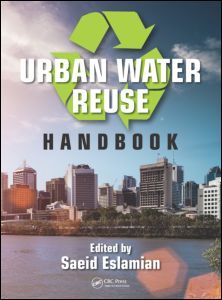Urban Water Reuse Handbook
Coordonnateur : Eslamian Saeid

Examining the current literature, research, and relevant case studies, presented by a team of international experts, the Urban Water Reuse Handbook discusses the pros and cons of water reuse and explores new and alternative methods for obtaining a sustainable water supply. The book defines water reuse guidelines, describes the historical and current development of water reuse, and includes previously implemented methodologies and practices relevant to urban wastewater treatment. It considers the sustainability of water resources and supply systems in both urban and rural areas.
The book discusses the advantages of water reuse (reduced water consumption, cost-savings, a secure groundwater replenishment source, and a long-term water supply) and outlines the disadvantages (a build-up of chemical pollutants in the soil, the probable contamination of groundwater attributed to reclaimed water, and possible human health risks related to the presence of viruses and bacteria). It also proposes ethical and cultural considerations, discusses the economic and environmental performance of water systems relevant to water reuse, and outlines associated methods and strategies that can address problems of water scarcity.
In addition, this handbook addresses:
- Constructed wetlands in surrounding urban areas
- Water reuse in specific regions, coastal areas, cold regions, arid zones
- Application of wastewater for hydroelectric power generation
- Traditional systems of water reuse
- Combining harvesting systems and water reuse structures
- Warning systems for wastewater access control
- Public participation and implementation issues
- Groundwater recharge by unconventional water
- Urban water reuse policy
A resourceful guide dedicated to the reuse of urban wastewater, the Urban Water Reuse Handbook focuses on wastewater treatment, recycling, and reuse for the conservation of water resources. This book serves as a reference for water resource engineers, urban hydrologists, and planning professionals; for water/wastewater engineers, students, policy makers, and researchers.
Saeid Eslamian is a full professor of hydrology and water resources engineering in the Department of Water Engineering at Isfahan University of Technology. He received his PhD in civil engineering from the University of New South Wales, Sydney, Australia. He has published more than 400 articles, mainly on sustainable water resources management, statistical and environmental hydrology in a changing climate. Professor Eslamian is founder and chief editor of the International Journal of Hydrology Science and Technology (IJHST) and the Journal of Flood Engineering (JFE). He has also authored approximately 100 book chapters and books that include the Handbook of Engineering Hydrology (2014) from CRC Press.
Date de parution : 02-2016
21x28 cm
Thèmes d’Urban Water Reuse Handbook :
Mots-clés :
Water Reuse; Wastewater Reuse; Water Reuse Regulations; Saeid Eslamian; Water Reuse Systems; Wastewater Treatment; Water Reuse Risk; Water Recycling; Impact Analysis; Reclaimed Water; Natural Wetlands; Toilet Ushing; Wetland Plants; CWs; Artificial Wetlands; Urban Water; Rainwater Harvesting in Cities; Water Reuse Application; Mitigation and Adaptation on Water Reuse; Rainwater Harvesting; Sustainable Water Reuse; Water Sensitive Urban Design; Sustainable Water Management; Cold Climate Regions; Treatment Wetlands; Wastewater Reclamation; Aeration Tank; Rainwater Harvesting Systems; SS; Landscape Irrigation; Stormwater Runo; Removal Eciency; Cod; NTU; Fecal Coliform



